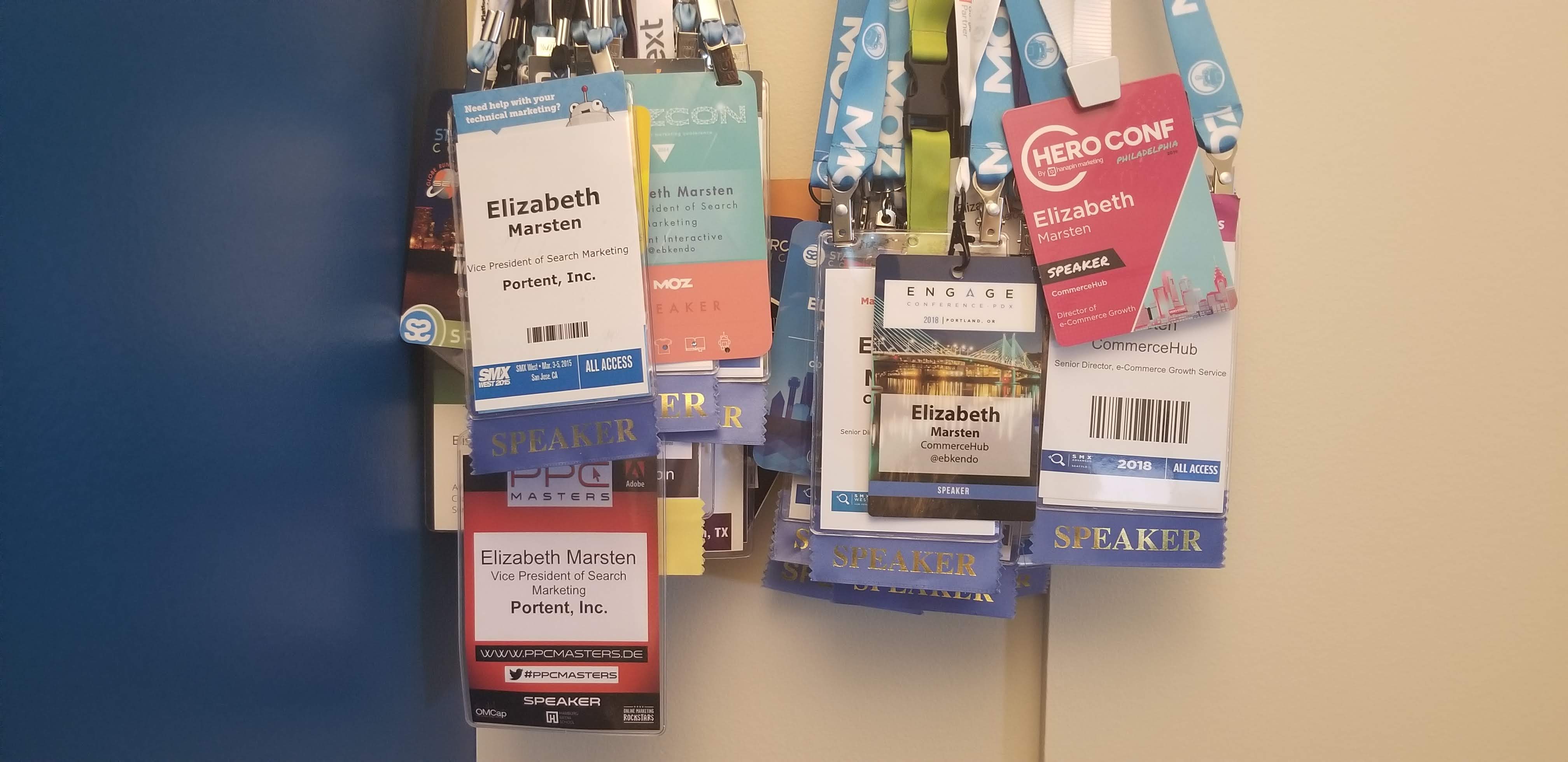Back in 2007, for a reason that I still can’t explain, I kept my very first conference pass for Search Engine Strategies (SES) conference in San Jose and every badge since then.
Whether I was an attendee, an exhibitor or a presenter, I’ve got them all. The bulk is, of course, search conference passes that range from my home town of Seattle to as far as Kolding, Demark and a LOT of places in between.

You would think then that I’m an extrovert, seeking out new experiences and relationships, while in truth, I’m much more of an introvert, especially with new people.
I prefer to huddle with those I already know or hide in my hotel room. So I understand the want to go to a conference and learn, but at the same time, struggle with coming back with business cards.
Those of you out there that thrive on the human connection and meeting new people – I envy you a little. You already know what to do.
So, after 65+ shows, here’s what you should know when it comes to navigating and making the most of that pass.
The Stuff You Already Know but Still Don’t Do
“Networking” means you do have to actually talk to people.
Say things like “my name is” and “I’m from” as lame openers sometimes.
Next level small talk is the “what session did you go to” and “what did you think of the keynote?”
It doesn’t have to be that way, but there is comfort in the generic and if you’re not comfortable with networking and opening conversations, well, start with what you know.
“If you’re nervous and alone, find someone else who’s alone. Odds are they’re in the same position as you and will welcome the company and that you took the pressure of networking off of them,” said Katie Scrimger, Associate Director, Paid Search at EliteSEM
A conference in NYC looks the same as a conference in San Jose, so do make sure to get out and look around.
Numerous times one of the best conversation starters I’ve had is either asking about the conference location or talking about something I saw or experienced, especially food choices.
Who doesn’t need a recommendation for dinner?!
The Importance of Lunch
One of the biggest and best ways to make the most of a networking opportunity – lunch. This finite amount of time helps ease the awkwardness in general.
I have consistently gotten some of the best takeaways from lunch, but it is a practiced skill to choose the right lunch table to have that experience.
I’ve noticed over the years, there are some very distinct lunch groups, including but not limited to:
- Works together/from the same company (usually a group of 2-3), doesn’t want to talk to anyone else. Usually, because they fear a sales pitch or that you’re going to steal their ideas. They all sit next to one another, turn and face each other and make it very clear that they’re not interested.
- Works together (usually a group of 4+) which will be obvious and if they want anyone else to sit with them or not. The not – they spread all their stuff out. The open – easy to sit down and talk to whoever is on the ends of the group.
- Worker Bee – alone, has a laptop out and furiously doing email/reports in between bites. Avoid.
- Phone Junkie – alone, has a phone out, but could be persuaded to put the phone down if there is no one else at the table. But if you don’t initiate, the “phlubbing” will continue.
- Program flipper – alone, has a program out and trying to decide which session to go to next. Sit with them, they want to talk.
- Solo – put them out of their misery already and sit down!
- All women – yes, that’s intentional. If you’re a woman and by yourself, have a seat. If not, best to keep going. If you’re not and ask, they’ll say yes to be polite, but typically these are ladies who are lunching.
When Talking About the Weather Fails
Sharpen your powers of observation and start with something like shoes or apparel.
For example, at one conference lunch, I noticed that the guy to my right, was clearly uncomfortable, had a Pokemon Go button on his watch band.
I asked him if he’d gotten his Mew yet – opened the conversation up, granted, not search related, but it made the conversation after that seamless.
You’d be surprised what a well-placed observation can kick start. (A word of caution though, an unwelcome observation can have the opposite effect.)
Talking to the Speakers
Remember this – they pitched and spent hours on a presentation, they are there because they want to be.
This usually means they are willing to talk more about whatever their presentation was on, so don’t hesitate or be shy about asking more.
Not everyone has their questions ready in the Q&A or sometimes the line is too long after the talk to get to the speaker.
If you see a speaker at lunch, at a reception, in the exhibit hall or in another session, you should absolutely approach them.
If a speaker wants to hide, they can and do, it’s really very easy between leaving early (due to business or personal reasons), speaker rooms, and adjoining conference hotels.
If you see a bunch of speakers in a group talking to one another – even better. Now you’re going to get to ask one question or offer one thought and get 3-4 experienced opinions or recommendations.
When speakers gather up like that, it’s not to shut you out, it’s because they don’t get to see each other very often and are from all over the country.
Like you, they’re taking the time and space to connect with colleagues, commiserate, and trade stories.
If a speaker is a first-time speaker (they usually admit this), you HAVE to approach. Seriously. They need our support!
Also, they’ve probably got a lot more to say or are willing to talk about and will spend far more one on one time with you than someone who speaks frequently.
Kirk Williams, owner of ZATO, brings a caution here:
“Finding a person who spent a lot of time and energy (and probably money) prepping to show up and accomplish one of the top fears for anyone (public speaking), only to insert yourself into the public sphere during Q&A time (or during their semi-private hallway conversations) with ways you disagree with them, or think they should have brought out Point XYZ better isn’t a great way to go about it. You probably have a great idea or something to share, but reserve Q&A for people wanting to learn and use your desire to engage with the speaker’s presentation by preparing your own written article, or session for the next year at the conference. If you think you can do it better than the speaker, you can always walk in their shoes by doing the hard work of preparation and showing up the next year and prove it! You very well could do it better, and I truly wish you the best in doing so, but you’ll also likely receive better understanding of how difficult it truly is to bring your A-Game as a speaker to every marketing conference. In other words, don’t try to trap speakers, but respect the hard work they’ve put in and are trying to communicate (albeit sometimes better than others, we’re all human!), and be willing to learn from them.”
There Are Sales People – Get Over It
Anyone who has been in agencies, especially speakers, almost always gets some sort of task to come back with “leads” or the continual need to justify the time and expense for something that builds their career alongside the obvious company benefits.
Most speakers are up for the soft sell, where if you initiate, then yes, they’re going to ask for your card and see about next steps.
Some like the sales side and some don’t – but their companies won’t continue to finance their trips if they don’t get out there too.
The sales people are there for the sole purpose of lead generation and are there because you are their target market.
You need tools, you need solutions and while no one likes being told “GET IN MY FUNNEL” it is a part of doing business.
You might as well take advantage of the one-stop shopping of an exhibit hall, get a free pen or two, and learn about what is out there.
Sales folks tend to move around between companies as well and if you make a good connection with one that you like, they’ll reach out from their next gig. But it’ll be a much more thoughtful and applicable than the favorite “greetings of the day” email.
After-Hours Parties & Cocktail Receptions
These are probably the hardest to network at – and that is their sole purpose. Funny, right?
The event created for networking, often encouraged with free beer and wine, is the one where you feel the most pressure to make new friends, but also a natural shyness in doing so.
I don’t advocate the use of liquid courage to get things going, but there is a reason it’s served. So, while you wander about in the probably huge hall, try and remember this advice from Lisa Raehsler, Big Click Co.:
“Ask questions and listen. If you have a passion for your work, networking is effortless. Do ask for a business card and follow up on LinkedIn.”
Just know that you’re not alone in your efforts to make new acquaintances and above all else, relax and have a good time.
More Resources:
- The Best SEO Conferences to Attend in 2019
- 7 Ways to Get the Most Out of Attending a Search Marketing Conference
- 5 Digital Detox Secrets to Empower Your Next Marketing Conference
Image Credits
In-Post Image: Taken by author, April 2019




